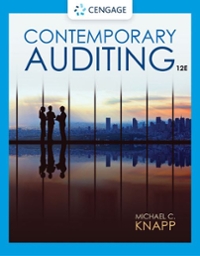The busy season that was winding down had been notable for Madison because it was her first
Question:
The busy season that was winding down had been notable for Madison because it was her first as an audit manager for her employer, a large practice office of a Big Four accounting firm. Her promotion from audit senior to audit manager had become effective five months earlier on October 1, one month following her five-year anniversary with the firm.
During each of the previous two busy seasons, Madison had served as the supervising audit senior on the audit of Smith & Kinder Manufacturing, a privately-owned company that produced a line of household appliances. As the onsite audit supervisor, her primary responsibilities had been encouraging and cajoling her five subordinates to complete their assignments within budget, bailing them out when they got "stuck" on tough technical issues, reviewing their completed workpapers, and keeping the audit manager informed of the overall progress being made on the engagement. She had also served as the primary contact person with the client's accounting staff and controller. On a few occasions, she had dealt directly with the client's C-suite executives, most notably the chief financial officer (CFO).
Madison was ecstatic when she received the news that she had been promoted to audit manager. Rather than working in the "trenches" on one audit engagement during busy season, in her new position, she would coordinate multiple audits at once.
In addition to frequent visits to the audit teams she was overseeing, Madison would spend considerable time working from her private office at her employer's downtown location-for the past three years, she had shared a cubicle in the audit senior "bullpen." Madison's first unpleasant surprise had come in early October when she was transferred off the Smith & Kinder audit team. She had assumed she would replace the audit manager on that team and be assigned to serve as the audit manager on two to four smaller jobs. Transitioning from audit senior to audit manager on the Smith & Kinder engagement would have allowed her to ease gradually into her new work role.
But when her practice office unexpectedly picked up a new oil and gas client, Daniel Alanis, an audit partner with whom she had worked in the past, requested that she be assigned to that new client, Le Prix Oil & Gas. Madison realized Alanis made that request because he respected her and the quality of her work. Nevertheless, in her mind, she was a questionable choice for the new engagement since she had only worked on two oil and gas audits during her five-year public accounting career. And those assignments had been during her first two years with her employer when she was an entry-level auditor.
Making the Le Prix assignment even more challenging for Madison was the highrisk nature of the engagement. During the past year, a sudden downturn in oil prices had slashed Le Prix's revenues and forced its management team to hurriedly downsize the company's operations and workforce. Le Prix's rapidly deteriorating operating results magnified its overall business risk-the company was highly leveraged with a debt-to-equity ratio topping 4.0. The most ominous audit risk factor, though, was the aggressive stances that the company's accounting staff apparently took on accounting and financial reporting issues. During a brief telephone conversation after Madison was assigned to the Le Prix audit, Daniel Alanis told her that the company had twice been forced to issue financial restatements over the previous seven years.
"I can imagine that in the current environment, these guys will ratchet up their earnings management efforts several-fold," Alanis warned Madison before adding,
"so, buckle your seatbelt, this may be a bumpy ride." At the time, Madison wondered to herself why her practice office would take on such a high-risk client. She didn't raise the issue with Alanis because she didn't believe it was appropriate to do so. In her firm's culture, it was not considered kosher to challenge or criticize decisions made by partners.
Questions
1. What steps should auditors take when they discover circumstances which were unknown to them at the audit report date that might have affected the report they issued?
2. Do you agree with Daniel Alanis that auditors are not entitled to make “honest mistakes”? Defend your answer.
3. Characterize the errors made by William Blackwell and Madison Wells as either “honest mistakes,” negligence, or recklessness. Defend each of your characterizations.
4. While reviewing the long-term debt workpapers, neither Madison nor Alanis discovered the critical error Blackwell had made when testing Le Prix’s compliance with its debt covenants. What auditing standards, if any, dictate that audit workpapers be reviewed by senior members of an audit team? What is the overall nature and purpose of the audit workpaper review process, and how thorough or detailed should workpapers be reviewed?
5. In your opinion, how should Madison have reacted to Alanis’s temper tantrum? What would you do in a similar set of circumstances?
6. When Alanis refused to discuss with Madison how Le Prix’s debt covenant violations had been addressed, what alternatives were available to her? Place yourself in her position. Which of those alternatives would you have chosen?
Step by Step Answer:






